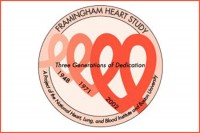Preclinical Heart Failure Is More Common Than You Think
Heart failure occurs when the cardiac muscle is weakened and can no longer meet the demands of the other organs in the body. Preclinical heart failure, also known as heart failure (HF) stages A and B, is characterized by an elevated risk of developing HF without having the actual condition according to the American Heart Association/American College of Cardiology.
 A recent study of 6,770 Framingham Heart Study participants (average age 51 years), found that the prevalence of preclinical HF is close to 60 percent. Furthermore, individuals with stage B HF were found to be at increased risk of death, as they had greater circulating levels of cardiac stress biomarkers.
A recent study of 6,770 Framingham Heart Study participants (average age 51 years), found that the prevalence of preclinical HF is close to 60 percent. Furthermore, individuals with stage B HF were found to be at increased risk of death, as they had greater circulating levels of cardiac stress biomarkers.

“We found a higher proportion of men were classified into more advanced HF stages compared with women and that the prevalence of HF stages increased with age. Of note, nearly 38 percent of people between ages 65 to 75 years and 43 percent of those older than age 75 years had evidence of preclinical HF stage B. Additionally, 32 percent of people less than 55 years of age were classified as stage A HF,” explained corresponding author Vanessa Xanthakis, PhD, Assistant Professor of Medicine and Biostatistics and an Investigator for the Framingham Heart Study.
Considering the large health care burden of HF, these findings emphasize the importance of screening and prevention in HF. Xanthakis added, “In this context, knowledge of the burden of precursors of HF in the community is a fundamental prerequisite to screen for and prevent the condition”.
Funding for this study was provided by AHA Clinical Research Program 13CRP14090010 and by NHLBI contract N01-HC-25915.
Submitted by Elie Sader, MD